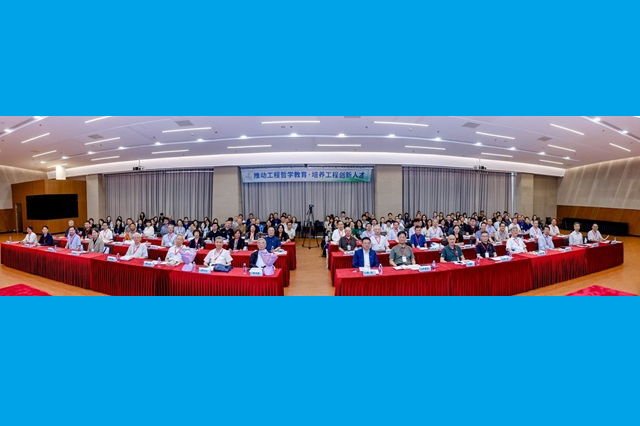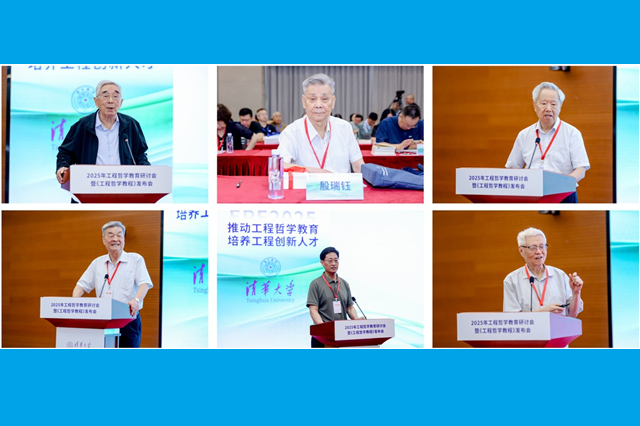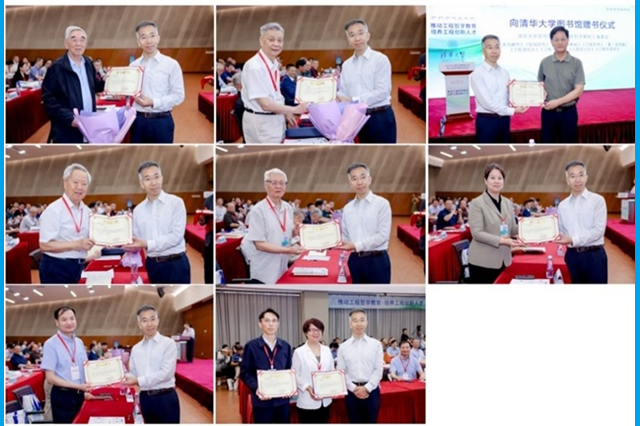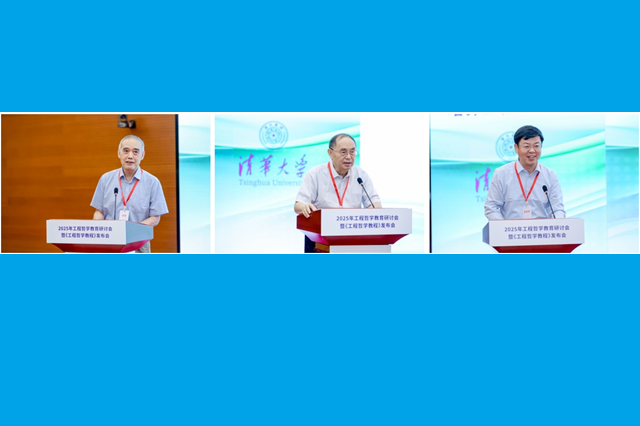Position: Home> Media Center > Events

On August 23, 2025, the “2025 Symposium on Engineering Philosophy Education and the Launch of the Textbook of Engineering Philosophy” co-hosted by the UNESCO International Centre for Engineering Education (ICEE) and the Engineering Philosophy Committee of the Chinese Society for Dialectics of Nature, was successfully held at Tsinghua University.
The symposium, themed “Promoting Engineering Philosophy Education and Cultivating Innovative Engineering Talents,” was organized by the Fundamental Industrial Training Center of Tsinghua University and the Interdisciplinary Engineering Research Center of the University of Chinese Academy of Sciences. It was co-organized by the School of Education at Tsinghua University, Higher Education Press, the editorial offices of Research on Education Tsinghua University, Engineering Education Review, and Engineering Studies: Engineering in an Interdisciplinary Perspective, the Ministry of Education of China’s Virtual Teaching and Research Office for Engineering Maker Education, and the Committee on Science and Engineering Education of the Chinese Society of Educational Development Strategy.
Distinguished participants in the symposium included PENG Gang, Vice President of Tsinghua University; YUAN Si, Executive Director of ICEE and former Vice President of Tsinghua University; ZHU Gaofeng, former Vice Minister of the Ministry of Posts and Telecommunications; YIN Ruiyu, former Vice Minister of the Ministry of Metallurgical Industry; FU Zhihuan, former Minister of Ministry of Railways; LU Chunfang, former Vice Minister of Ministry of Railways; ZHENG Yangheng, Vice President of University of the Chinese Academy of Sciences; LI Bocong, Professor at the University of the Chinese Academy of Sciences; LIU Dachun, Professor at Renmin University of China; and CHEN Fan, Professor at Northeastern University. LIU He, Vice President of the Chinese Society for Dialectics of Nature and Director of its Committee on the Engineering Philosophy, delivered a written address.
The symposium agenda encompassed a series of activities, including opening addresses by leaders, the official release of the textbook of Engineering Philosophy, books donation ceremony, keynote presentations, academic discussions, and dedicated sessions on teaching practices and experience-sharing in the engineering philosophy. The address session was chaired by WANG Sunyu, Deputy Director and Secretary-General of ICEE, and Professor at the School of Education, Tsinghua University.
PENG Gang’s Opening address
PENG Gang emphasized that engineering practice cannot be separated from the guidance of the engineering philosophy, which in turn draws rich nourishment from engineering practice. The core aim of education in the engineering philosophy is to foster innovation in engineering. He expressed the hope that this symposium would serve as a new starting point to further deepen theoretical research in the engineering philosophy, continuously advance its educational practice, and focus on cultivating innovative engineering talents with a solid grounding in philosophy and outstanding engineering capabilities, thereby contributing more effectively to the building of a strong nation.

Members of CAE and Experts Speech
During the keynote speeches and academic sessions, members of the Chinese Academy of Engineering (CAE) and professors, including ZHU Gaofeng, YIN Ruiyu, FU Zhihuan, LIU Dachun, LU Chunfang, and LI Bocong, each delivered speeches.
ZHU Gaofeng pointed out that, compared with science, engineering is more closely connected to the social sciences. He emphasized that the Division of Engineering Management of CAE and researchers in engineering philosophy need to conduct in-depth studies on major issues concerning the close integration of engineering with the economy and society.
YIN Ruiyu stated that this meeting is timely and highly significant, and that the publication of the Textbook of Engineering Philosophy will have an important impact on the development of engineering education in China, the advancement of engineering philosophy, and the cultivation of engineering talent.
FU Zhihuan remarked that engineering ecology represents a new way of thinking and a new paradigm in engineering research, and that ecological thinking is crucial for the future of engineering development.
LIU Dachun believed that research in engineering philosophy and the publication of the Textbook of Engineering Philosophy mark important progress in China’s studies of dialectics of nature and stand out as a highlight in the development of new philosophy.
LU Chunfang stated that the rise of engineering philosophy is a response to the call of the times, and that engineering philosophy can provide a comprehensive and systematic value framework for engineering construction and management.
LI Bocong pointed out that the essence and content of “geqi zhizhi” (investigating things to attain knowledge) lie in engineering and engineering science, with engineers as the main agents. He stressed that cultivating design thinking plays a central role in engineering activities and engineering education.

Book Donation Ceremony
During the symposium, ZHU Gaofeng, YIN Ruiyu, LU Chunfang, FU Zhihuan, LI Bocong, ZHANG Lina, WANG Dazhou, YANG Shijie, and BAO Ou donated to the Tsinghua University Library a collection of books including The Biography of ZHU Gaofeng, The Biography of YIN Ruiyu, A Textbook in the Engineering Philosoph, The Engineering Philosophy (1st, 3rd, and 4th editions), On the Evolution of Engineering, Methodology of Engineering, Epistemology of Engineering, and Ecology of Engineering. JIN Jianbin, Director of the Tsinghua University Library, accepted the donation on behalf of the library and presented certificates of donation.
The closing session of the conference was chaired by QIAO Weifeng, Assistant to Secretary General of ICEE and Associate Professor in Researcher at the School of Education, Tsinghua University. YUAN Si, Executive Director of ICEE and former Vice President of Tsinghua University, emphasized that engineering education should not be limited to the transmission of technical skills; it must also cultivate talent with philosophical thinking, systems thinking, creativity, and a strong sense of humanistic concern. He stressed that education in the engineering philosophy should “rooted in engineering, driven by engineering, enhancing engineering, and returning to engineering.” He proposed joint efforts to establish regular communication mechanisms and platforms, in order to promote the solid rooting, blossoming, and fruitful development of engineering philosophy education, thereby advancing the cultivation of outstanding and innovative engineering talent.

Closing Session
More than 200 experts and scholars from over 100 research institutes, universities, and enterprises across the country, representing diverse fields and academic disciplines, attended the symposium.
 京公网安备 110402430053 号
京公网安备 110402430053 号